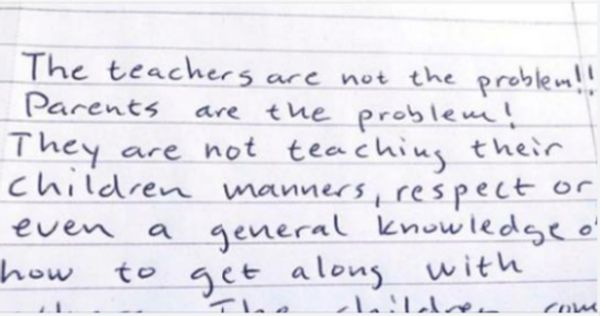Education is a crucial aspect of a young person’s development, and teachers play a significant role in shaping their future. Unfortunately, many teachers today face overwhelming workloads and inadequate compensation. This has led to a high rate of burnout and disillusionment among educators. While several factors contribute to this issue, some teachers believe that parents are one of the main culprits.

One opinion piece that gained widespread attention was a letter written by retired teacher Lisa Roberson in 2017. In her letter, published in the Augusta Chronicle, Roberson expressed her frustrations with the education system and placed the blame squarely on parents. Her words continue to ignite debate, especially in light of the challenges brought about by the pandemic and virtual learning.
“As a retired teacher, I am tired of people who know nothing about public schools or haven’t been in a classroom recently, deciding how to fix our education system,” Roberson began. “The teachers are not the problem! Parents are the problem!”
Roberson argues that parents are not adequately preparing their children for learning. She points out that many students lack basic manners, respect, and social skills. Some even come to school wearing expensive shoes but without basic school supplies. In many cases, teachers have to dig into their own pockets to provide these necessities. Roberson also questions whether parents are actively involved in their children’s education, attending parent nights and regularly communicating with teachers.
In conclusion, she asserts that the responsibility for a child’s education lies with the parents. Until parents step up and fulfill their role, nothing will improve.
The Parent-Teacher Relationship in the Real World
In an ideal world, parents and teachers would work harmoniously to provide the best education for children. However, the reality is much more complicated, especially in the aftermath of the pandemic. Lockdowns forced parents to take a more active role in their children’s education. This period also sparked debates over various contentious issues, such as vaccinations, gender identity, race theory, and school closures.
Despite these challenges, both educators and parents share a common goal: giving children a solid education that prepares them for the future. Teachers must find creative ways to engage and motivate their students, while parents must ensure their children possess the necessary skills and discipline.
However, various reasons may prevent parents from getting actively involved in their children’s education, while others may become overly involved. Scott A. Roth, a certified school psychologist, believes that overprotective parenting, or “helicopter parenting,” can be just as detrimental as absentee parenting. Children who never experience disappointment or frustration may struggle to develop problem-solving skills.
Navigating the parent-teacher relationship has become more challenging than ever. Many students have fallen behind due to the pandemic, and there is a severe shortage of teachers that exacerbates the fatigue and burnout experienced by those who remain in the classroom. The pandemic has also worsened children’s behavior, rendering pre-pandemic routines and techniques less effective.
Collaboration is Key
Amidst these challenges, both parents and teachers must collaborate to make the most of children’s education. It is essential to establish a working relationship where information is shared and strategies are implemented.
“The best way to keep students accountable for their behaviors is to have a working relationship with the parents,” says Brandi David, an educator specializing in mathematics. Teachers should communicate with parents about effective techniques such as calming corners, breathing exercises, and opportunities for behavioral correction.
Creating a safe and caring environment is crucial for student learning. When students feel supported and connected with their teachers, behavioral problems are significantly reduced.
As the world continues to evolve, schools must adapt their curricula and approaches to better serve the changing needs of students. Education reform efforts are underway to modernize curricula, incorporate personalized learning, leverage technology, and move away from standardized testing. Patricia A. Edwards, a professor specializing in literacy learning, emphasizes the importance of addressing issues of inequity, teaching life skills, and integrating technology.
In the end, collaboration between parents and teachers is crucial for the success of our children’s education. By working together, we can ensure that students have the best possible chance to thrive in the ever-changing world they will inherit.





